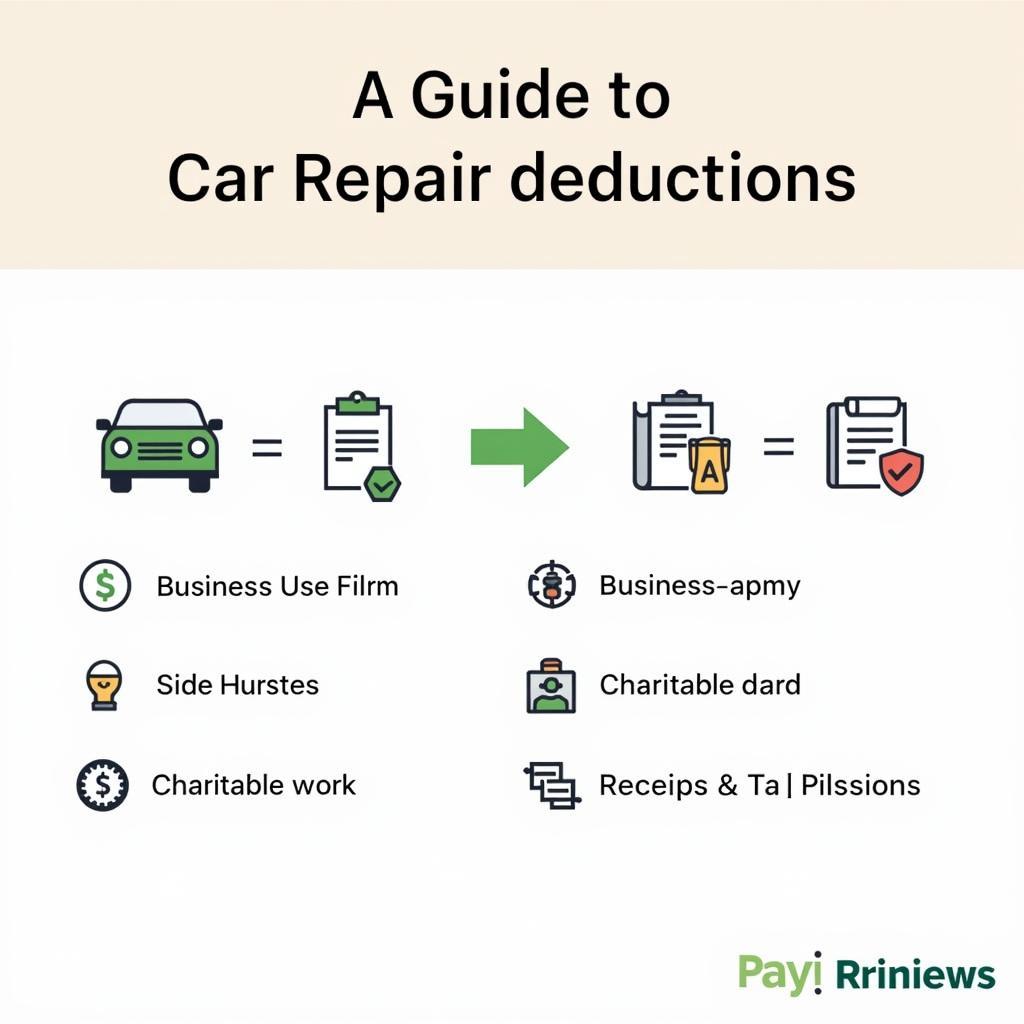You meticulously track your business expenses throughout the year, but what about those unexpected car repairs? Can you claim those on your taxes too? Unfortunately, it’s not as simple as writing off every oil change and tire rotation. Let’s break down when personal car repairs might be tax deductible and what you need to know to stay on the IRS’s good side.
Understanding the Basics of Car Repair Deductions
The deductibility of car repair expenses hinges on how you use your vehicle. The IRS distinguishes between “business use” and “personal use.”
- Business Use: If you use your car primarily for business purposes – think ride-sharing, delivery services, real estate agents – you might be eligible to deduct car repair expenses.
- Personal Use: If you mainly use your car for personal reasons – commuting to work, running errands, family trips – car repair costs are generally not tax-deductible.
Important Note: Commuting to and from your regular workplace is typically considered personal use, even if you occasionally run work-related errands during your commute.
When Personal Car Repairs Can Be Tax Deductible
Even if you use your car primarily for personal reasons, there are a few exceptions where you might be able to deduct car repair costs:
- Using Your Car for a Side Hustle: If you use your personal car for gig work like food delivery or ride-sharing, you can deduct expenses related to that specific business activity.
- Driving Between Multiple Job Sites: If you work at more than one location in a single day, you can potentially deduct expenses for driving between those jobsites.
- Driving for Charitable Purposes: If you use your car for volunteer work for a qualified charity, you might be able to deduct mileage or actual car expenses, including repairs.
 Car Repair Deduction Guide
Car Repair Deduction Guide
How to Claim Car Repair Deductions
When it comes to claiming car repair deductions, the IRS offers two primary methods:
1. Standard Mileage Rate: This method allows you to deduct a set rate per mile driven for business purposes. For 2023, the standard mileage rate is 65.5 cents per mile. Using this method simplifies your record-keeping, as you only need to track your business mileage.
2. Actual Expenses: This method involves deducting the actual costs you incurred for car repairs, depreciation, gas, insurance, and other car-related expenses. This method could lead to a larger deduction if your actual expenses are higher than the standard mileage rate. However, it requires meticulous record-keeping.
Expert Insight:
“Choosing the right deduction method depends on your individual circumstances,” says Tax Advisor Emily Carter. “If your car has high repair costs or you have a newer model with significant depreciation, the actual expenses method might be more beneficial. However, the standard mileage rate offers simplicity and can still result in significant savings.”
Essential Record-Keeping Tips
To support your car repair deductions, maintaining detailed records is crucial. Here are some key pieces of information to track:
- Mileage Log: Maintain a detailed log that includes the date, purpose of the trip (business or personal), starting and ending mileage, and total miles driven.
- Receipts: Keep all receipts for car repairs, maintenance, gas, insurance, parking fees, and tolls.
- Other Documentation: If you’re claiming actual expenses, keep records of your car’s purchase price, depreciation schedule, loan interest (if applicable), and lease payments (if applicable).
Conclusion
While personal car repairs are generally not tax-deductible, specific situations allow you to claim these expenses. Understanding these exceptions and keeping meticulous records can potentially save you money come tax time.
Need help navigating the intricacies of car repair deductions? Contact us via WhatsApp: +1(641)206-8880, Email: [email protected]. Our team of experts is available 24/7 to provide personalized guidance and ensure you’re maximizing your tax savings.

Leave a Reply